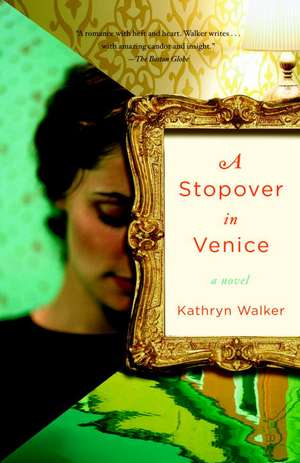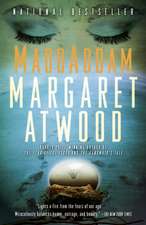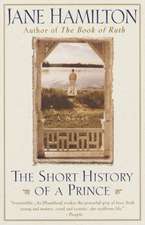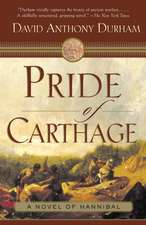A Stopover in Venice
Autor Kathryn Walkeren Limba Engleză Paperback – 30 sep 2009
Bewildered, Nel returns to Venice where she encounters a tiny dog who leads her to a enigmatic stranger, a contessa, and a decaying Gothic palazzo. She is soon drawn into a world of charismatic characters, centuries of Venetian history, and the mystery of a lost masterpiece. What begins as a tale of loneliness and heartbreak opens into a dazzling, enchanting story of secrets and self-discovery in a magical city.
Preț: 117.17 lei
Nou
Puncte Express: 176
Preț estimativ în valută:
22.42€ • 23.47$ • 18.55£
22.42€ • 23.47$ • 18.55£
Carte disponibilă
Livrare economică 17-31 martie
Preluare comenzi: 021 569.72.76
Specificații
ISBN-13: 9780307386502
ISBN-10: 0307386503
Pagini: 305
Dimensiuni: 132 x 203 x 18 mm
Greutate: 0.24 kg
Editura: Anchor Books
ISBN-10: 0307386503
Pagini: 305
Dimensiuni: 132 x 203 x 18 mm
Greutate: 0.24 kg
Editura: Anchor Books
Notă biografică
Kathryn Walker attended Harvard University and was the recipient of a Fulbright Fellowship. She has appeared in leading roles on and off Broadway and has received an Emmy Award for her performance in the PBS series The Adams Chronicles. She adapted and directed a series of classical Greek productions for the Verse Drama program at the 92nd Street Y and has been an artist in residence at Harvard. She lives in Tesuque, New Mexico, and Washington, Connecticut.
Extras
Watching the train roll out of the station, picking up speed, it occurred to me that I had been impetuous. Disappearing down the track, within that train, were the only human beings of my acquaintance in northern Italy—in all of Italy, for that matter, if you didn’t count Guido, the ingratiating concierge briefly known at our hotel. My husband and his band of not entirely merry men were speeding away to Verona, to Milano, to Bologna, on and on until they would arrive in Roma, the Eternal City, in several weeks’ time.
And where was I?
There was no sign that I could see on the narrow platform. It was, I think, the second stop the train had made since leaving Venice. Venezia the beautiful, the sinister, the enchanting city of water and light. Venice, the place I had not remotely experienced in the days I had just spent there. That’s how the argument must have started. My regrets. My regrets dismissed and so on, until I found myself there, outside the train.
And the argument? I couldn’t remember. It hardly mattered, whatever it was, it was the same thing. It’s true, isn’t it, that the long dispute that is marriage, for the unlucky anyway, loses its energy after a few years of failing to reveal much to anyone? It loses its optimism, its hope of revelation; the whole thing dissolves into a miasmic pall, a kind of weather. A miserable way to live. The damp penetrates the spaces between, then gathers and rains down the usual resentments, barely spoken, of no particular interest to anyone. Neither party seems to retain much apparent hope or regret, and that in itself is unbearable. So I couldn’t remember how it started, the blank amnesia of low-level numb despair brought on by these events. We spoke probably; few words are necessary. I do remember the familiar sensation of gloom rising and the awful visceral sense of entrapment that I feel in that sullen climate, as if my body is trying to conceal itself in back of itself. Also the certain knowledge that there would be no help found in the present company. Encircling doom. I would sit in a bitter fog for however long it took to get to Verona. Lovely Verona, no doubt. Encountered in misery. One more unexperienced destination.
Then something unusual happened. I stood up, stepped over my husband’s long legs, not particularly carefully, dragged down whatever piece of my luggage was stashed above our seats, and got off the train.
That, after eight years of marriage, had taken a mere five minutes, the time required for the train to pull in, halt briefly, and pull out of the station. How? What desperate, gagged Ariel in my beleaguered soul had struggled free in this lunge for the air? And what did Antony think? That I was still on the train? Sulking in the club car?
The train was gone. The track and the platform were empty. I was standing next to an unoccupied green bench. I was aware of being marooned in every sort of emptiness. My suitcase looked unfamiliar. I felt light-headed and disoriented. The afternoon was blustery and threatening. Lightning actually cracked.
I did not speak Italian.
I pictured myself sitting in the now vanished train and felt like a ghost.
These regrets of mine, the previously mentioned problem with these trips, these tours, rather, was that we went to wonderful places, wonderful cities all over the world. We went, just as we went to Chicago and Cincinnati, and it made not a bit of difference wherever we might happen to be. It would always be a late arrival at an upscale corporate hotel, a five-star something that could be anywhere, room service, sleep, room service, sound check, performance, exhaustion, and moving on—or doing the same thing the next day, with a possible brief interval of shopping or lunch. I was not exhausted because I had nothing to do. Nor did I seem to have the courage to find transportation from a venue miles from the city to explore alone a place I’d never seen. Though I longed to. The being-aloneness of the effort tended to overwhelm the impulse. Or had.
I am not well suited to be a solitary traveler. I’m not gregarious, too cautious, too shy in a way, and had not usually, not ever, done the research necessary to enable me to move swiftly in determined pursuit of places of interest in a huge unfamiliar city. Also, I couldn’t see where the pleasure would be. That was what companions were for, no? The whole day before us and what shall we do? Companionship made all things possible, delightful, if I remembered. That was my fantasy anyway, time spent traveling to rise every day like a little cake, a treat to be savored. Companionship. That was the real issue, of course, disguising itself as another sort of deprivation, the deprivation of a glorious city unseen, a city passing by like a smear on the windshield, which had often, in fact, been literally the case. Oh, that was Brussels? I wish it weren’t dark.
I wish we could see it together.
Of course that wasn’t what we were there to do and I had no right to this self-indulgent resentment. I was free to do whatever I liked but other people were working. If I was so miserable, I could always stay at home and do whatever it is I do there. Or go home, for that matter. Life would go on; I had a credit card.
I had a credit card.
It had begun to rain. I couldn’t just stand there for the rest of the day. Alone and palely loitering.
I didn’t know the geography of Venice but felt sure I could locate the Gritti Palace Hotel, or someone could do it for me. A Doge’s palace. Truly, anciently Venetian. A dream. I would check in; later I would have room service, compose myself for whatever would happen tomorrow, and go to sleep. I did not miss the irony. I crossed the track and hailed the inbound train.
Not much could be viewed of the Grand Canal from the cabin of the water taxi; the windows were curtained and opaque with steam. Outside the cabin door, water was everywhere, the only thing to see, above, below, huge sheets of spray to each side. A high-speed shipwreck, I thought. And then we were there.
The lobby of the Gritti Palace Hotel is neither palatial nor even particularly opulent; it is, as it happens, cozy, small, and wood-paneled. Still, I sensed that one should sweep in here with an excess of expensive luggage and a retainer or two; one should not be alone, apprehensive, and without a reservation. Nevertheless the desk clerk was charming and welcoming. My single suitcase was not embarrassing and I was dressed in black, the all-purpose disguise. Disguising what?
He was sorry to tell me but the hotel was full, except for one or two small rooms on the side of the building undergoing some renovation. Would that be all right for tonight? He might be able to move me later. So relieved was I by his friendliness that I thanked him effusively and offered my credit card, saying it would be fine for me and how grateful I was to be able to stay.
It crossed my mind briefly to wonder what this might cost, even the small room. Antony would be disapproving. He would assume one of those disdainful, sour expressions that make even his face ugly. To indulge myself in this way! If indulging myself was, in fact, what I was doing. On his money. Unspoken naturally.
And so I was shown to my accommodation. I had to laugh. The room was a cell. Tiny, a narrow bed, pretty furniture apparently, although it was hard to know since the single window was shuttered tight and only a dim lamp illuminated the gloom. The window opened an inch or two, but any attempt to move the shutters was frustrated by scaffolding pressing from the outside. A little five-star cave. No wonder the desk clerk was amused and accommodating. Or perhaps he was sincere about the move, but really, what did it matter? The room had all the features of a hideout, and wasn’t that what I was doing, what I’d done? All I seemed to have achieved so far was an extemporaneous flight to a sumptuous little grotto like some decadent eremite on the run. I had no idea what I was doing.
The bed was hard, for which I was grateful. I wanted to wash away the travel film and think. The afternoon was getting on, the rain had stopped. Having come this far I felt I should at least set foot on the pavements of Venice, glimpse the famous light, but that would require going outside and I lacked the will. I had spent so many hours in hotel rooms, so many hours by myself, laying down my Russian novel and thinking, Yes, I am alone, but my enviable husband is out there somewhere and will come back. If only to get his clothes, as had sometimes crossed my mind. The shocking idleness of that life, the waiting, the emptiness, the pointlessness. As if I had been partially paralyzed. There is some sort of wasp, I think, who, already having enough to eat, paralyzes his victims to keep them fresh and immobile, ready and waiting, should his appetite return. A harem must be a similar event.
Antony was in Verona by now. I had his itinerary but he didn’t have mine. Was he alarmed? Annoyed? Postponing a reaction until he checked in, worked out, and had dinner? Until he found himself alone in his room, something he can hardly bear? All performers, I suppose, have a double personality, but Antony’s seemed extreme. He was so glamorous and engaging onstage, so generous and embracing, boyish in some way but passionate, like a human searchlight throwing its golden beam across the adoring crowd. I myself was still subject to that seduction when I watched from the wings. Here in Italy, a famous writer visiting backstage during a show only last week could hardly be restrained from flinging himself into what he called the “Dionysian heat” of the occasion.
From the Hardcover edition.
And where was I?
There was no sign that I could see on the narrow platform. It was, I think, the second stop the train had made since leaving Venice. Venezia the beautiful, the sinister, the enchanting city of water and light. Venice, the place I had not remotely experienced in the days I had just spent there. That’s how the argument must have started. My regrets. My regrets dismissed and so on, until I found myself there, outside the train.
And the argument? I couldn’t remember. It hardly mattered, whatever it was, it was the same thing. It’s true, isn’t it, that the long dispute that is marriage, for the unlucky anyway, loses its energy after a few years of failing to reveal much to anyone? It loses its optimism, its hope of revelation; the whole thing dissolves into a miasmic pall, a kind of weather. A miserable way to live. The damp penetrates the spaces between, then gathers and rains down the usual resentments, barely spoken, of no particular interest to anyone. Neither party seems to retain much apparent hope or regret, and that in itself is unbearable. So I couldn’t remember how it started, the blank amnesia of low-level numb despair brought on by these events. We spoke probably; few words are necessary. I do remember the familiar sensation of gloom rising and the awful visceral sense of entrapment that I feel in that sullen climate, as if my body is trying to conceal itself in back of itself. Also the certain knowledge that there would be no help found in the present company. Encircling doom. I would sit in a bitter fog for however long it took to get to Verona. Lovely Verona, no doubt. Encountered in misery. One more unexperienced destination.
Then something unusual happened. I stood up, stepped over my husband’s long legs, not particularly carefully, dragged down whatever piece of my luggage was stashed above our seats, and got off the train.
That, after eight years of marriage, had taken a mere five minutes, the time required for the train to pull in, halt briefly, and pull out of the station. How? What desperate, gagged Ariel in my beleaguered soul had struggled free in this lunge for the air? And what did Antony think? That I was still on the train? Sulking in the club car?
The train was gone. The track and the platform were empty. I was standing next to an unoccupied green bench. I was aware of being marooned in every sort of emptiness. My suitcase looked unfamiliar. I felt light-headed and disoriented. The afternoon was blustery and threatening. Lightning actually cracked.
I did not speak Italian.
I pictured myself sitting in the now vanished train and felt like a ghost.
These regrets of mine, the previously mentioned problem with these trips, these tours, rather, was that we went to wonderful places, wonderful cities all over the world. We went, just as we went to Chicago and Cincinnati, and it made not a bit of difference wherever we might happen to be. It would always be a late arrival at an upscale corporate hotel, a five-star something that could be anywhere, room service, sleep, room service, sound check, performance, exhaustion, and moving on—or doing the same thing the next day, with a possible brief interval of shopping or lunch. I was not exhausted because I had nothing to do. Nor did I seem to have the courage to find transportation from a venue miles from the city to explore alone a place I’d never seen. Though I longed to. The being-aloneness of the effort tended to overwhelm the impulse. Or had.
I am not well suited to be a solitary traveler. I’m not gregarious, too cautious, too shy in a way, and had not usually, not ever, done the research necessary to enable me to move swiftly in determined pursuit of places of interest in a huge unfamiliar city. Also, I couldn’t see where the pleasure would be. That was what companions were for, no? The whole day before us and what shall we do? Companionship made all things possible, delightful, if I remembered. That was my fantasy anyway, time spent traveling to rise every day like a little cake, a treat to be savored. Companionship. That was the real issue, of course, disguising itself as another sort of deprivation, the deprivation of a glorious city unseen, a city passing by like a smear on the windshield, which had often, in fact, been literally the case. Oh, that was Brussels? I wish it weren’t dark.
I wish we could see it together.
Of course that wasn’t what we were there to do and I had no right to this self-indulgent resentment. I was free to do whatever I liked but other people were working. If I was so miserable, I could always stay at home and do whatever it is I do there. Or go home, for that matter. Life would go on; I had a credit card.
I had a credit card.
It had begun to rain. I couldn’t just stand there for the rest of the day. Alone and palely loitering.
I didn’t know the geography of Venice but felt sure I could locate the Gritti Palace Hotel, or someone could do it for me. A Doge’s palace. Truly, anciently Venetian. A dream. I would check in; later I would have room service, compose myself for whatever would happen tomorrow, and go to sleep. I did not miss the irony. I crossed the track and hailed the inbound train.
Not much could be viewed of the Grand Canal from the cabin of the water taxi; the windows were curtained and opaque with steam. Outside the cabin door, water was everywhere, the only thing to see, above, below, huge sheets of spray to each side. A high-speed shipwreck, I thought. And then we were there.
The lobby of the Gritti Palace Hotel is neither palatial nor even particularly opulent; it is, as it happens, cozy, small, and wood-paneled. Still, I sensed that one should sweep in here with an excess of expensive luggage and a retainer or two; one should not be alone, apprehensive, and without a reservation. Nevertheless the desk clerk was charming and welcoming. My single suitcase was not embarrassing and I was dressed in black, the all-purpose disguise. Disguising what?
He was sorry to tell me but the hotel was full, except for one or two small rooms on the side of the building undergoing some renovation. Would that be all right for tonight? He might be able to move me later. So relieved was I by his friendliness that I thanked him effusively and offered my credit card, saying it would be fine for me and how grateful I was to be able to stay.
It crossed my mind briefly to wonder what this might cost, even the small room. Antony would be disapproving. He would assume one of those disdainful, sour expressions that make even his face ugly. To indulge myself in this way! If indulging myself was, in fact, what I was doing. On his money. Unspoken naturally.
And so I was shown to my accommodation. I had to laugh. The room was a cell. Tiny, a narrow bed, pretty furniture apparently, although it was hard to know since the single window was shuttered tight and only a dim lamp illuminated the gloom. The window opened an inch or two, but any attempt to move the shutters was frustrated by scaffolding pressing from the outside. A little five-star cave. No wonder the desk clerk was amused and accommodating. Or perhaps he was sincere about the move, but really, what did it matter? The room had all the features of a hideout, and wasn’t that what I was doing, what I’d done? All I seemed to have achieved so far was an extemporaneous flight to a sumptuous little grotto like some decadent eremite on the run. I had no idea what I was doing.
The bed was hard, for which I was grateful. I wanted to wash away the travel film and think. The afternoon was getting on, the rain had stopped. Having come this far I felt I should at least set foot on the pavements of Venice, glimpse the famous light, but that would require going outside and I lacked the will. I had spent so many hours in hotel rooms, so many hours by myself, laying down my Russian novel and thinking, Yes, I am alone, but my enviable husband is out there somewhere and will come back. If only to get his clothes, as had sometimes crossed my mind. The shocking idleness of that life, the waiting, the emptiness, the pointlessness. As if I had been partially paralyzed. There is some sort of wasp, I think, who, already having enough to eat, paralyzes his victims to keep them fresh and immobile, ready and waiting, should his appetite return. A harem must be a similar event.
Antony was in Verona by now. I had his itinerary but he didn’t have mine. Was he alarmed? Annoyed? Postponing a reaction until he checked in, worked out, and had dinner? Until he found himself alone in his room, something he can hardly bear? All performers, I suppose, have a double personality, but Antony’s seemed extreme. He was so glamorous and engaging onstage, so generous and embracing, boyish in some way but passionate, like a human searchlight throwing its golden beam across the adoring crowd. I myself was still subject to that seduction when I watched from the wings. Here in Italy, a famous writer visiting backstage during a show only last week could hardly be restrained from flinging himself into what he called the “Dionysian heat” of the occasion.
From the Hardcover edition.
Recenzii
“A romance with heft and heart. Walker writes … with amazing candor and insight.” –The Boston Globe
“Emotional restlessness, thwarted desire, the insinuating attraction of the past: These are Walker’s concerns, and her romantic subject matter lends them an attractive, dramatic background.... Walker’s prose is always engaging.” –San Francisco Chronicle
“Delightful.... A modern fairy tale.” –More
“Smart, sexy.” –People
“Kathryn Walker’s beautifully written story of parallel discovery and restoration is powered by searing insights into the costs of love and loss. Longing leads to the recognition of the ‘mysterious gifts concealed in the dark folds of pain.’ The results are joyous.” –Amy Hempel, author of Reasons to Live and The Dog of the Marriage
“Tender.... Venice is lovely any time of year.” –New York Daily News
“[Walker] writes with a graceful fluidity that elevates this novel and makes it an immensely enjoyable read.” –Planet
“This intriguing debut novel quickly charms the reader into a magical world.” –Library Journal
“Walker paints lovely pictures of Venice, with its legendary light ... its crumbling palazzos, and its maddening maze of unmarked city streets and alleys. And she does a convincing job of evoking the emotional netherworld of a young woman who fell into a particular sort of marriage (the one-sided kind that often comes with fame) before she was fully prepared.... Refreshingly realistic.... An appealing story, filled with convincing scholarship and fascinating historical detail.” –Pasatiempo
“A Stopover in Venice is radiant with mystery, romance and history.... Nel–subtle, perceptive, and witty–in flight from a suffocating marriage, discovers the elusiveness of understanding the present, as well as the past, in this brilliant novel of retracing and discovery.” –Susanna Moore, author of The Big Girls and In the Cut
“Walker’s debut novel is an intriguing mix of romance, art history, and mystery.” –Booklist
“Emotional restlessness, thwarted desire, the insinuating attraction of the past: These are Walker’s concerns, and her romantic subject matter lends them an attractive, dramatic background.... Walker’s prose is always engaging.” –San Francisco Chronicle
“Delightful.... A modern fairy tale.” –More
“Smart, sexy.” –People
“Kathryn Walker’s beautifully written story of parallel discovery and restoration is powered by searing insights into the costs of love and loss. Longing leads to the recognition of the ‘mysterious gifts concealed in the dark folds of pain.’ The results are joyous.” –Amy Hempel, author of Reasons to Live and The Dog of the Marriage
“Tender.... Venice is lovely any time of year.” –New York Daily News
“[Walker] writes with a graceful fluidity that elevates this novel and makes it an immensely enjoyable read.” –Planet
“This intriguing debut novel quickly charms the reader into a magical world.” –Library Journal
“Walker paints lovely pictures of Venice, with its legendary light ... its crumbling palazzos, and its maddening maze of unmarked city streets and alleys. And she does a convincing job of evoking the emotional netherworld of a young woman who fell into a particular sort of marriage (the one-sided kind that often comes with fame) before she was fully prepared.... Refreshingly realistic.... An appealing story, filled with convincing scholarship and fascinating historical detail.” –Pasatiempo
“A Stopover in Venice is radiant with mystery, romance and history.... Nel–subtle, perceptive, and witty–in flight from a suffocating marriage, discovers the elusiveness of understanding the present, as well as the past, in this brilliant novel of retracing and discovery.” –Susanna Moore, author of The Big Girls and In the Cut
“Walker’s debut novel is an intriguing mix of romance, art history, and mystery.” –Booklist











